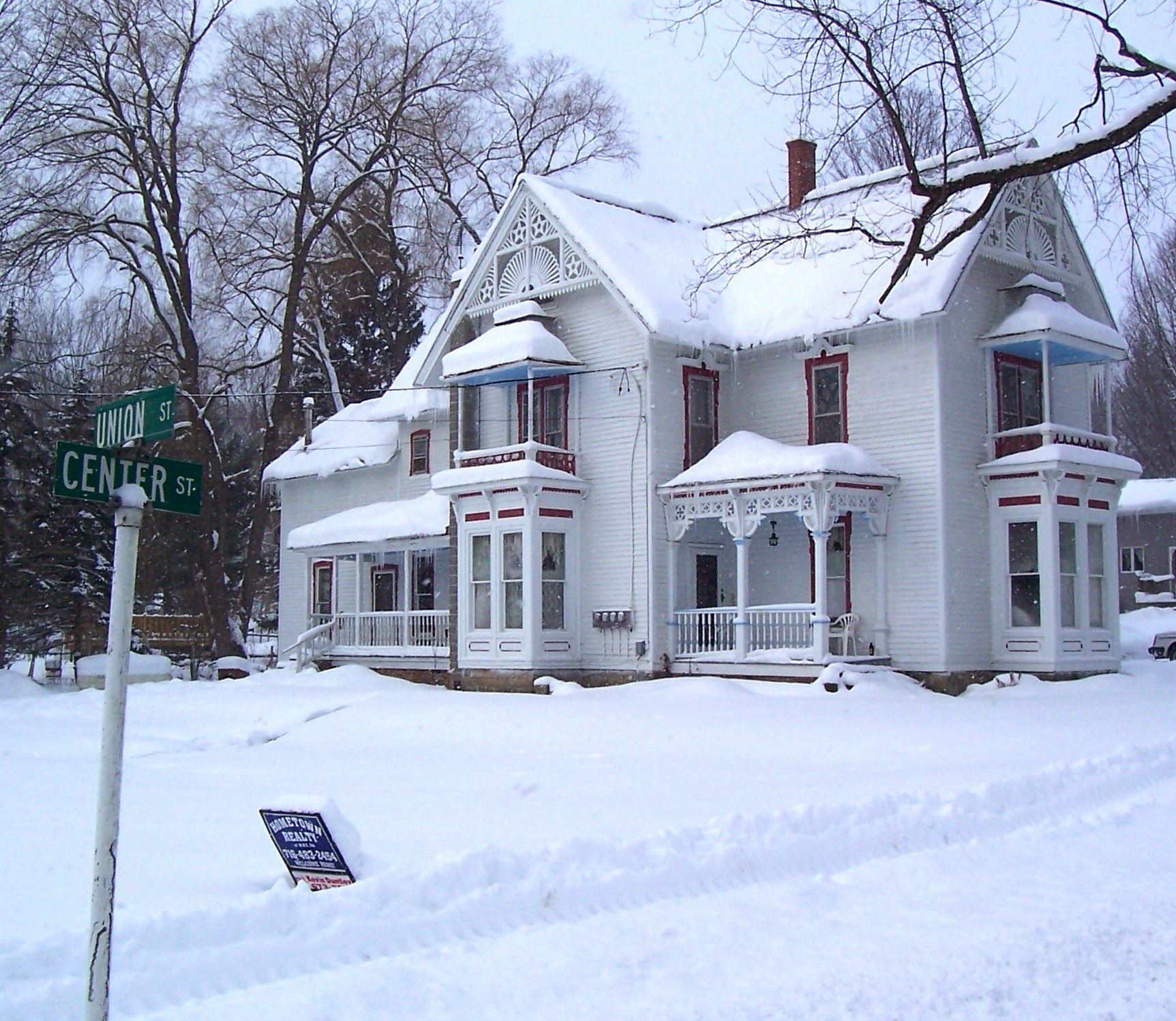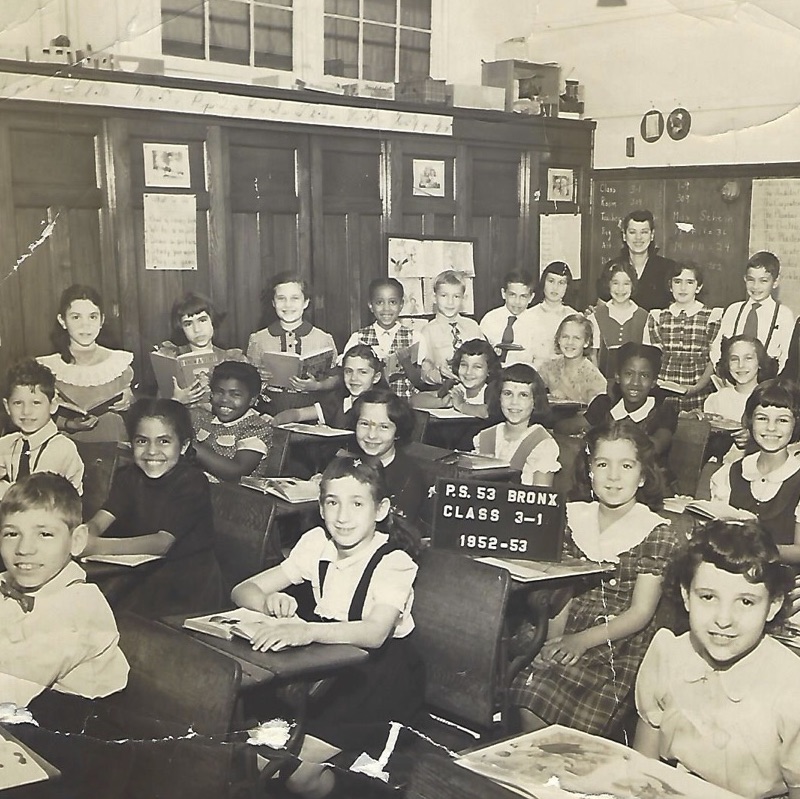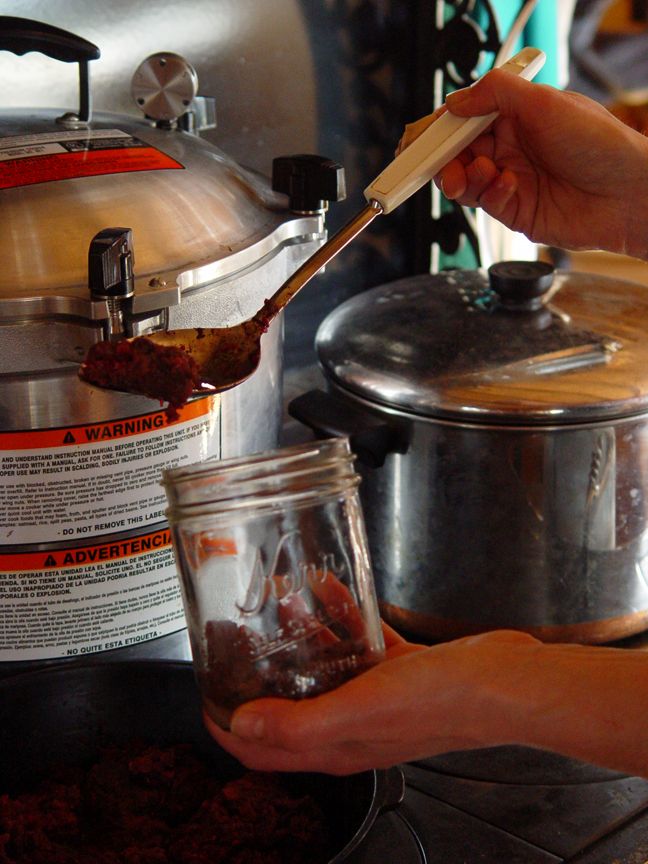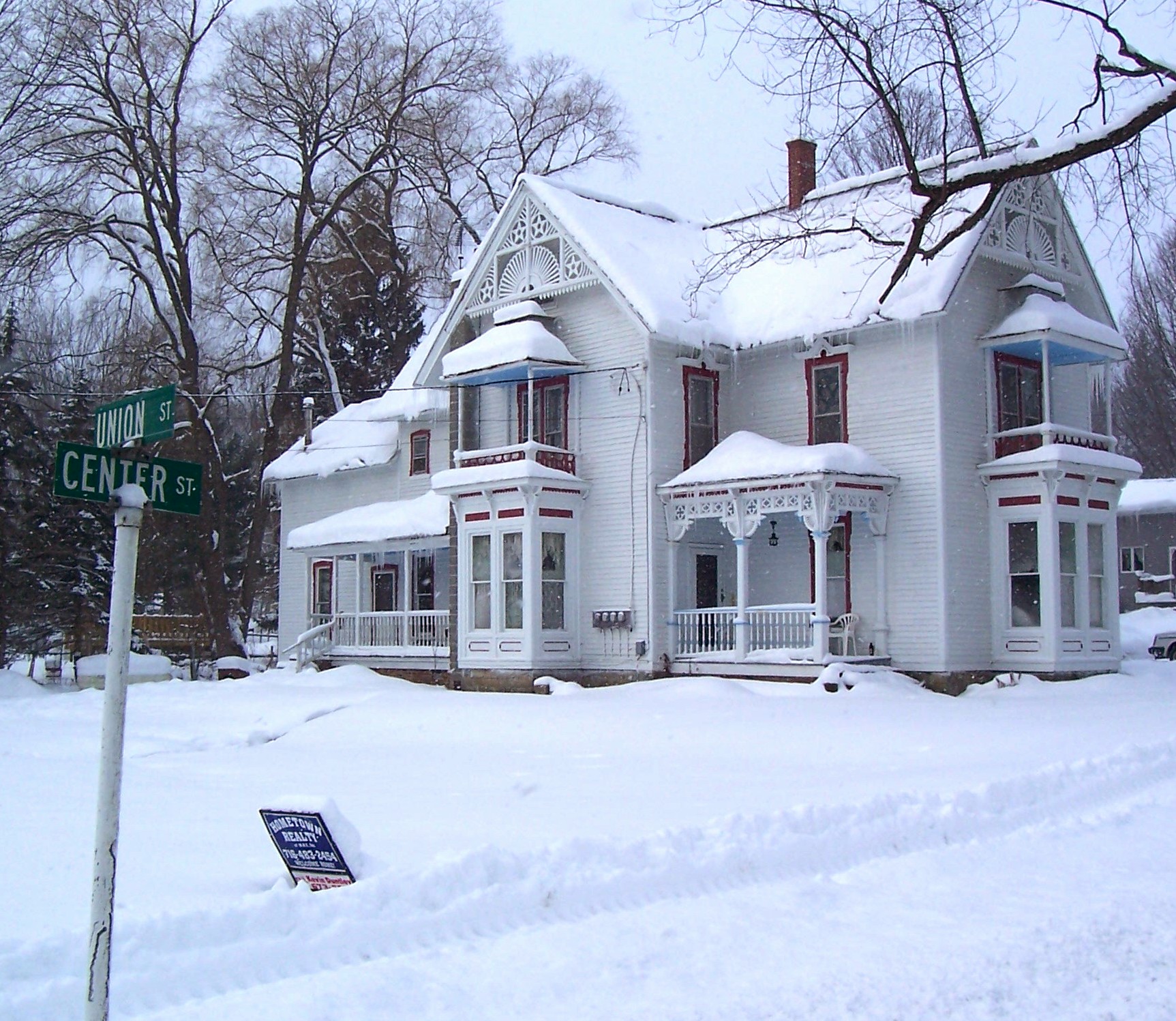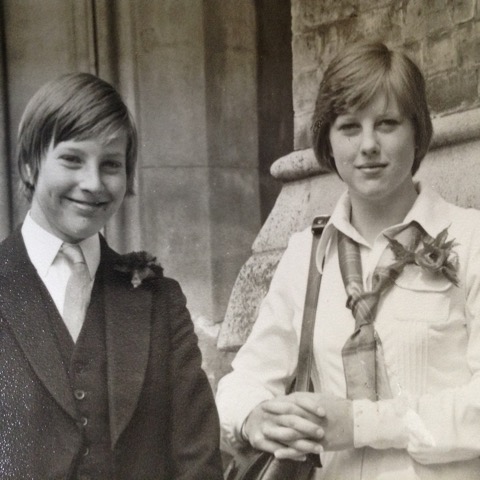I cried the first time I saw the apartment that would become our home for the next five years. It was October of 1999 and beginning to get seriously cold. Snow would start dumping from the saggy-bellied gray clouds by the truckload at any moment.
I had run away from home with my four children a few months earlier, finally aware that we had to escape the increasingly dangerous situation...though it took my husband’s setting the house on fire for me to fully recognize the danger. Since that time it had become clear--even from within my abuse-fogged condition--that going back was not an option. I felt utterly unprepared to handle life and four kids on my own, but there was no choice. We had to retrench now, before winter came raging in.
My mother had an old house in a small farming community near her home that had been split up into apartments. The upper apartment had become available just as I was recognizing the need to find something more permanent. I hadn’t seen the inside of the house for years, but since I knew the kind of tenants she’d had I did not have high hopes. Still, it would be safer than home.
Enviously irrepressible, my children clambered from our ramshackle van almost before it stopped in the drive. Varying in age from four to eleven, they mounted a daring exploration of their new world. The Victorian-era structure was an absolute castle to them, and quite possibly crawling with ghosts. I slid the rusty van door shut, tugging it by sheer force to maneuver the last bit.
"What’s this door go to?" Luke asked, yanking the heavy cellar door open from its slanted position against the back of the house.
"The basement. Don't go down there," I answered wearily.
"Gross! Dead, white spiders!"
I peered down into the disgusting dirt cellar, filled with other people's garbage.
"They’re just covered with mold. Come out of there. It’s not healthy."
The three girls had been circling the house, yelling, "It’s ours, it’s ours, it’s ours!" in happy unison. They ran over, breathless, with Rachel, the youngest, doggedly tagging behind on her shorter legs.
"Mom, there’s wooden lace over the windows!" Sarah shouted.
I had to smile at her willingness to be pleased. "I think it’s called gingerbread, honey. It is pretty, isn’t it?"
"Can I pick the first bedroom?" Bridgett pleaded, and jumped up and down when I nodded assent.
Their enthusiasm might have cheered me, but instead it only sharpened the point of my grief. The basic birthrights of childhood had been stripped from them one by one, until all it took to make them ecstatically happy was a place where they didn't have to be afraid.
The house rested in the midst of an unkempt yard like a gracious old lady, patiently maintaining her architectural dignity amidst the growing shabbiness of the neighborhood. This three-storied ginger-breaded beauty was once some rich man's boast, looked after by a team of devoted servants. But the years had not been kind. She had become a neglected heap, as out of place as a glamorous old movie starlet flaunting furs and silken gowns in a day when everyone else wore blue jeans.
Even in this shabby state, however, her former beauty couldn’t be hidden. Fancy, wooden spider webs adorned each roof peak, and curvaceous curlicues tumbled down the roof line and frothed around windows. Flakes of ancient lead paint marred the elegant lines, making it seem she'd survived some dread plague--scarred yet triumphant. This only made the house more attractive to me. The pairing of this forlorn Victorian lady-house with my exiled family seemed perfectly fitting.
Sogginess seeped through my sneakers as I stood calf-deep in the shaggy grass. I squinted upward to scrutinize the second-story apartment, and caught my breath to see lacy, personal-sized balconies jutting from beneath three sets of impossibly long windows. I had forgotten those delicate additions. I could almost see myself sitting up there, curled in the middle of a snug bean bag with a steamy cup of coffee cradled between chilled hands, contemplating the misty morning view from a place of safety. Waves of serenity washed over me, and yet I was frightened. Many things frightened me then.
I turned to regard the four figures cavorting noisily on the lawn, unreasonably trusting me to handle the details of their young, uprooted lives. But my children needed for me to know what to do, so I would pretend that I did. Clutching the strange key, I climbed the few stairs of the small side porch attached to our potential apartment, shaking a little and disgusted with myself for it.
My first glance inside was less than encouraging. The storm door drooped downward at a painful angle when I swung it open, dangling by one distressed hinge. If the shabby-glorious exterior was daunting, then the interior of our would-be sanctuary was simply pitiful. Filthy, possibly orange-tinted carpet from the seventies released an unpleasant odor reminiscent of rotting mushrooms as I stepped cautiously inside. Some kind of ungainly wardrobe construction dominated one short wall of the entryway. This was meant to collect coats and boots, I assumed, but it overflowed with creepy jumbles of junk abandoned by former occupants. I shuddered and looked away.
A dark, elaborate pillar marked the commencement of a beautifully-carved, sticky-looking handrail coiling gracefully upward to the second level. Deep gouges pocked the vaguely pinkish wall curving in tandem with the staircase, revealing spots of naked gray plaster beneath the grimy paint. Undoubtedly, these injuries had been perpetrated by generations of careless apartment-dwellers bashing the walls as they hauled belongings up and down the gently twisting staircase.
I stood wilted at the threshold, hot tears mercifully blurring the ugly sight. Perhaps it seemed out of proportion, but my visceral reaction was more than mere sadness over callous abuse of a remarkable house. A bond of blended love, pity, and hope seemed to stretch between my battered soul and this beautiful, violated place.
Gradually, I became aware of the incessantly moving aural cue of the mother: the jubilant cacophony that accompanies a gaggle of children approaching. Rallying, I mounted the broad, shallow stairs with determination, comforted by the feel of the pleasing, solid curves of the handrail, and conjuring haunting visions of ladies dressed in sweeping gowns and splendid, feathered hats as I climbed. This house was meant for loveliness--both to exude it and to enshrine it.
But the spectacle that unfolded at the top of the stairs would not be easily reimagined. Oh, what had they done to her? Stunned into immobility, I heard the kids pound up the stairs behind me and patter to a discouraged stop. Even their boundless energy balked at the sight.
"Oh, it’s so ugly," Sarah breathed sadly.
"Why’d they do that, Mom?" Luke asked in a puzzled tone. I could only shake my head.
The wide woodwork that framed each doorway in fancy scrollwork looked as though someone had once acquired a fleeting spurt of ambition to repaint, and then--confused--thought better of it. A ghastly bedlam of mud tints splattered random surfaces in wildly disturbing non-patterns. I guessed it was someone's idea of spot-testing different shades before committing to the job.
There were more atrocities to be revealed. A wide path of grunge wiggled down the length of the hall like a long, terrible worm. Frayed, tan carpet was nastied here and there with remnants of pet droppings and more unmentionable-looking stains. Greasy lipstick kisses smeared the walls. Years of grime clouded over the slender, elegant windows. After taking a moment to regain my composure, I summoned the courage to climb to the third floor where the older kids would sleep. The children followed in a cautious chain, linking hands. We found the two miniature rooms, tucked into the very peak of the house, all over slathered in flat, dark blue paint--even the ceilings.
"That’s not going to be my room!" Bridgett shouted as we retreated down the skinny servants' staircase in a claustrophobic rush.
Like us, the house was temporarily overwhelmed by circumstance, but her sweetness wasn't obliterated, only hidden. All the goodness was still there to be found, underneath. I knew we could make a home here and flourish amidst the dilapidation of more prosperous days in cheerful solidarity, for there was not only pandemonium here; there was potential. And my children would never again have to be afraid in their own home.
Panting a little, I stood in the doll-sized kitchen. "None of this matters," I reassured my kids. "All it needs is a good scrubbing and some fresh paint."
"I can pretend to be Cinderella!" Rachel said.
Yeah!" Bridgett said, "We can wear aprons and Mom can boss us around!"
So it was decided. We got to work the next day, scrubbing grubby walls with endless buckets of warm suds, dragging abandoned junk to the curb, and shampooing the hideous stains from the cheap carpets. Calming cream and pastel-tinted paints erased the marks of her mistreatment as we painted over every square inch of the interior. Chaos slowly transformed into order. The old house must have felt quite revivified by the time we finished; she was clean and well-loved again, with four boisterous children gamboling about in her upper stories. Every one of us was blissfully content.
As Christmas neared, we festooned our apartment in holiday apparel flamboyant enough to please any grand dame. Glittering garlands entwined with colored lights twisted around her lovely staircase. Festive swags outlined the dimensions of the tiny kitchen, swooped down the creamy hallway, and draped around the wide entrance of the warm, many-windowed parlor that was our living room. An old saucepan full of cinnamon sticks and cloves simmered on the small woodstove as it breathed cozy heat into the drafty rooms. Everywhere, order and calm reigned. I read my children bedtime stories at night, and tucked them in without fear. Safe in the haven we'd created, we didn't even mind our poverty.
At least in theory. My husband had abandoned any pretense of responsibility and conveniently disappeared, but having escaped the horror of a life spent crushed beneath the arm of a cruel man, this hardly felt like a tragedy to me. It was sheer relief. A few months free from the numbing influence of fear had cleared my mind wonderfully. Minus the life-draining dramas of a chronically unhappy person, I found I could easily deal with the hassles of everyday life.
Realistically, though, my slim wages as a cashier barely stretched to cover basics for the five of us. Although I had scraped together enough to buy a few token gifts for the children, nothing was left for the extravagance of a Christmas tree with which to adorn our pretty refuge. Undaunted, still reveling in the exotic freedom, my children flung lights around the jade plant and reverently placed their few wrapped presents around its pot.
Luke was on his knees, happily shaking his present. "This will be the best Christmas ever!" I turned away, wiping the tears with the back of my hand.
Our predicament was hardly my responsibility, but I couldn't help but feel guilty remembering the magic cocoon of anticipation surrounding the Christmases of my childhood. My children had never known the joy of watching their father bluster and complain through the door, with winter winds whistling around him as he triumphantly dragged inside a perfect, long-needled Christmas tree. They understood the situation as deeply as children can, but still I ached to give them a happy Christmas like those I remembered. They deserved one bright spot shining through in their dusky world.
Our house was situated at the outside edge of a small, rural community. Everyone who has ever lived in such a place knows there's no point trying to keep personal affairs quiet, but that's not all bad. The neighbors were aware of our dire circumstances, and some of these good folk were unable to tolerate the thought of the four charming children they’d seen trailing behind me through the grocery store not having a proper Christmas.
So it was that we chugged home in our elderly van one dark, snowy evening to find two fat bags of groceries waiting for us on the porch. Another night, a freshly-cut Christmas tree stuck perkily into the snowbank in our driveway.
"Santa must have gave us this," Rachel lisped happily.
A few days later, the old doorbell shrilled. I peeked down through the hall window--a cautious habit I'd developed, not knowing when my husband might unexpectedly reappear. Two men stood on the porch, shifting from foot to foot--nervously, I thought. I went anxiously down the glowing staircase fighting a sick stomach. Did these strangers have news of my missing husband, or were they more bill-collectors, come to harass me for his debts?
I pulled the heavy door open a suspicious crack, and peered out. The men introduced themselves. They hoped I wouldn't be offended, but they'd heard of our difficulties and had taken up a collection from their union brothers to give my children a decent Christmas. I opened the door properly, then and stammered my thanks, unashamed to let them see my grateful tears. Clutching the sparkling, money-stuffed Christmas card, I watched them back out of the drive. The embers of my soul, so nearly snuffed out, glowed a little brighter.
My husband did eventually return. By that time, I had found my strength. I knew better than to return to the prison from which we’d so narrowly escaped. In spite of the difficulties to come, the years we spent in our pretty apartment were remarkably happy ones. The turning of every year found our situation a little better, until finally we were able to move into a home of our own.
The last time I locked the dark, heavy door that had been left behind from another era, I looked up at our apartment. I remembered that first uncertain, hopeful winter and, as on that first day, I cried.
Following a long hiatus to tend to her family, Rhonda Brunea has only recently returned to writing for publication. Her work has appeared in periodicals and anthologies, including Woman’s World, Chicken Soup for the Soul, Grit, and Ladybug. She currently lives in Cherry Creek, NY, and is soon to relocate to Orkney, Scotland.
